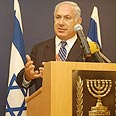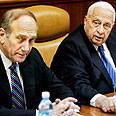

Netanyahu, his eyes red after a sleepless night (several sleepless nights, according to him), showed up at the Finance Ministry’s conference room. His aides rolled down a blue screen behind him: A blue screen looks better on TV.
No less than four flags were placed to the left and right of the former minister. Israeli flags. A bit excessive for a finance minister, but definitely befitting of someone who wants to become prime minister, again.
To the photographers’ satisfaction, Netanyahu used a lot of hand gestures. His hands waved freely, I told him later. “My soul was free,” he said. “Now I am a free man.”
When he phoned Knesset Speaker Reuven Rivlin to inform him of the resignation, he said: A burden has been lifted off my shoulders.
Netanyahu has trouble deciding. His resignation Sunday came following six months of zigzagging. But when he does decide, he knows how to strip the decision of any doubts, and, retroactively, be at peace with it.
A senior Finance Ministry official said in amazement after receiving word of the decision, “I have never seen anyone so at peace with himself.”
Little did he know that Netanyahu has an internal ventilator, a wonder-fan, if you will, which produces a tail wind for him at every important intersection of his career.
Late for everything
Resignation, just as any other tough decision, stems from a combination of motives. Netanyahu was not comfortable with the disengagement from day one - not due to the withdrawal from Gaza: He has long since contended that Israel must withdraw from Gaza and evacuate its settlements. But he did not approve of the unilateral aspect of the plan, as well as the withdrawal from the entire area, including the Philadelphi route and the sea and air ports, which will operate without Israel supervision.
Netanyahu dismisses the claims that only in this way would the international community free Israel of its responsibility for the 1.3 million Gaza residents. He regards these claims as legal mumbo jumbo. The world will not thank Israel for not supervising over the entrance of weapons to Gaza’s ports. Prime Minister Ariel Sharon must learn from British Prime Minister Tony Blair when it comes to the war on terror.
Terror will chase those who concede to it.
Netanyahu opposed the disengagement, but voted in favor on the night of the attempted "putsch" at the Knesset, when the alliance between ministers opposed to the plan, led by Netanyahu himself, collapsed miserably.
He opposed the disengagement, but as finance minister he allocated NIS 7-8 billion (USD 1.6 - 1.8 billion) to cover its expenses. To his defense, Netanyahu says the decision stemmed from the government and Knesset and it would be inconceivable that the finance minister or his ministry would sabotage it.
It is true, of course, that every finance minister can find ways to thwart budgetary decisions he or she is opposed to. Netanyahu simply accepted the verdict.
Aside from the diplomatic and security-related considerations, and perhaps even more important, is the political reason for the resignation. The moment Netanyahu reached the conclusion that Sharon was running for another term in office, a face-off between the two became unavoidable.
Netanyahu could not afford to spend time in Sharon’s shadow; Sharon casts a shadow only over those who vote for him.
Netanyahu had to position himself to the right of Sharon. It is there, where the entire Likud Party once was, that he feels most comfortable.
The question was how and when he would resign. Netanyahu, who is always late for everything, was again late by a few months, politically speaking. Meanwhile, the disengagement became a fact.
Netanyahu’s resignation, which could have overturned the decision had it come a year ago, will not make a difference. He knows it. A few weeks ago, when I quoted officials from the right as saying that “everything is in Netanyahu’s hands,” he was quick to explain that nothing is up to him. The evacuation will be approved by an automatic majority in the government and Knesset. There is nothing that can be done.
It was important for Netanyahu to maximize his success as finance minister; to pass the reforms; to capitalize the renewed economic growth; to present the budget.
What will history say?
The problem is that the market reform does not interest the Gush Katif settlers and their supporters too much. When they will be evacuated from their homes in two weeks time, they will curse Sharon, but they will hold a grudge against Netanyahu, who, in their minds, sold them out to Sharon in exchange for the Bachar Reform.
Signs carried by pullout objectors who had protested in Sderot and Ofakim read, “Netanyahu is a rag.” These signs are sure to vanish from the scene now, but it is doubtful whether they will fade out of consciousness.
Netanyahu, one of his political allies says, understood that he had exhausted his tenure as finance minister. Sharon would no permit him to continue with the budget cuts.
Netanyahu presumed that Defense Minister Shaul Mofaz and IDF Chief Dan Halutz, who had criticized the planned cut in the defense budget, realized that they had Sharon’s support.
Of all these explanations and excuses, Netanyahu chose to emphasize the historical reason for his move: I am the son of a historian. It is important to me what people will say…that in 10, 50, 100 years from now they will say: Netanyahu was not a part of this.
No one knows what people will say a hundred, or even fifty years from now. Netanyahu will not be there to hear and take comfort in what people will say. Even Vice Premier Shimon Peres and Sharon will probably not be there.
Moreover, the question of what people will think of Netanyahu 10 years from now is important mostly to Netanyahu, his family, and his biographer.
Netanyahu’s ‘historical’ consideration reinforces the claim that he is overly focused on himself, on his ego. Every politician is concerned about what people will say about him or her, but the reserved ones know how to disguise this consideration as ‘the betterment of the nation.’
However, it is very possible that Netanyahu is right when he warns of the establishment of a terrorist Islamic state in Gaza that will drown Israel in blood. Perhaps he is also right when he assumes the disengagement would only increase political pressures on Israel.
Should Netanyahu’s ominous prophecies become a reality, all eyes will be focused on him.
Blindness
Netanyahu’s key word on Sunday was “blindness”: The government is embracing the disengagement blindly, just as another government embraced Oslo. The fact that he was forced to accept Oslo due to electoral constraints, just as he had accepted the disengagement due to ministerial constraints, is irrelevant. “Blindness” is a catchy word that will resurface in the coming weeks and months.
There is no vacuum in politics. Netanyahu refrains from consulting with the right-wing Likud ministers in the aftermath of the failed coup d'etat; they in turn, are isolating him for the time being.
He is free, but also alone; his bitter rival Deputy Prime Minister Ehud Olmert is inheriting his finance minister post as though he were born for it.
In the next two weeks, when the settlers will charge at Gush Katif, Netanyahu will charge at the Likud. The Likud Party, and not Kissufim road, is where his true battlefield lies.
















